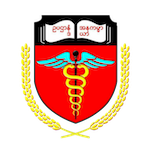The students acquire knowledge of the pathological basis of diseases through studying gross specimens, histopathological slides, haematological slides, laboratory investigative procedures and data interpretation.
General Pathology covers the topic of response of the body to external stimuli, infectious diseases, changes in hemodynamics, neoplasia, fluid accumulations in tissues, diseases of immune origin and genetics. The lectures are supplemented by tutorials, practical demonstrations of slides and morbid specimens.
Teaching of microbiology is to acquire knowledge of basic principles of microbiology, immunology and parasitology including the nature of pathogenic microorganisms, pathogenesis, laboratory diagnosis, transmission, prevention and control of diseases common in Myanmar.
Topics include general microbiology, systematic bacteriology, immunology, mycology, virology, public health microbiology, parasitology, entomology and applied medical microbiology. The students observe correlation between practical findings and theory.
A wide range of topics including general and systemic pharmacology is taught throughout the academic year. General principles of pharmacokinetics and pharmacodynamics and significant and useful aspects of drugs are taught. The drugs are classified according to their primary actions, for example, the central nervous system, autonomic nervous system, gastrointestinal tract, etc. Essential drugs concept and rational use of drug are emphasized during the course.
Lectures are supplemented by small group discussion/tutorials (written and oral) which are conducted weekly; and practicals which consist of experiments illustrating certain aspects of drugs taught in the lectures and pharmacokinetic calculations.
Nullam quis risus eget urna mollis ornare vel eu leo. Nullam id dolor id nibh ultricies vehicula ut id elit. Donec ullamcorper nulla non metus auctor fringilla. Maecenas sed diam eget.
